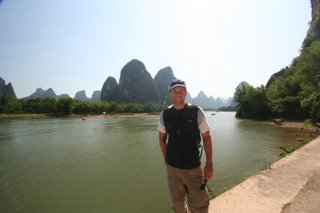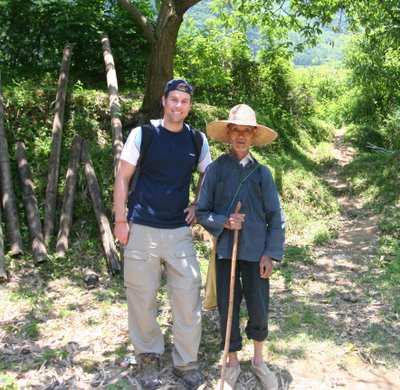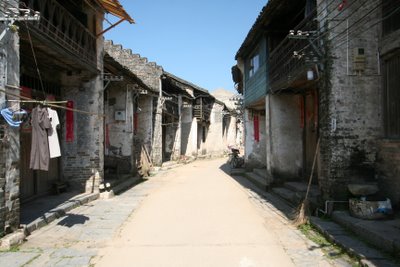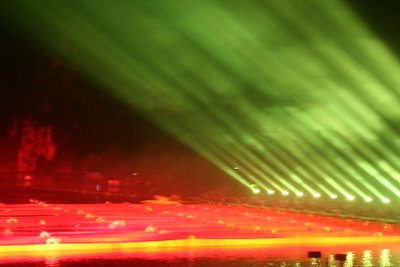Ni hao (pronounced “knee how”) from Yangshuo

It’s not often your plane lands in a 300 million year old sea bed. But that is exactly what I did on Monday arriving in Guilin, China. A cross between Ha Long Bay (Vietnam) and Yosemite, limestone karsts jut thousands of feet skyward. Meandering rivers flow through the valleys below, the main waterway being the Lijang River.
Less than a minute into my taxi ride from the airport, the driver handed me his mobile phone. On the other end of the line, was “Jerry”, a travel agent for CITS, China International Travel Service. Jerry spoke English well and asked to meet me at my hotel. Figuring I had nothing to lose by meeting with him, I agreed.
True to his word, forty minutes later, Jerry was waiting for me in the hotel lobby. At the time, I was thinking that free market competition had this guy cleverly in cahoots with taxi drivers phoning him when independent travelers arrived, but later I would see it differently. Jerry asked me what I planned to do and if he could help arrange outings for me during my stay. I explained that I did not want to do the tourist circuit which he said he understood. In the next breath he booked me on the Lijang River cruise for the following morning as he said there would be good weather. As it was only a half day, the river cruise was a popular tourist attraction and undeniably one of the best ways to see the geological magic of the area.
But Jerry was interested in much more than what I was doing the following morning, he wanted to know where I would be for my entire stay in the region and when I would be leaving. His eagerness to help began to show through more as an extension of the tracking my whereabouts and discovering my intentions. He strongly encouraged me to book several different tours and when I inquired about hiking trails by myself, he explained it was not a good idea in China.
Resisting Jerry’s plans for my entire stay, he gave me his card and asked that I call him each evening to plan the next day. And when I didn’t call, Jerry called me. Apparently, the hotel let him know when I arrived back in the lobby as moments after I entered the room (even after switching to a hotel 70 kilometers away), my phone rang and it was you know who, Jerry. He wanted to know what I had done, was doing and wanted to do under the guise of whether he could be of any help. I began to get the feeling Jerry was assigned to me, more than trying to woo my business.
Jerry aside, the following day I cruised the Lijang with about 40-50 other tourists, once again confirming my desire to steer clear of tour groups. The cruise was a good way to understand the terrain, but it was not the on hands experience for which I was searching. After the cruise docked in Yangshuo, the plan was for a van to return the group to Guilin an hour later. However, I spent my first hour in town finding an independent unofficial guide who would take me into the surrounding hills. When it came time for the van to leave, I waved them off and decided to remain in the smaller, scenic and character filled town of Yangshuo.
Renting a mountain bike, resisting many guides offering to ride with me, I set course for a trail head just on the edge of town.
 After a few wrong turns and a quick map check, I found the trail and rode off into the countryside. Just a few kilometers outside of town, the landscape reflected the agrarian lifestyle of old China, with rice fields as far as the eyes could see. Almost always, it was women, not men, who were hard at work in the fields, hoeing, weeding and planting. It is hard, back straining work, day in and day out.
After a few wrong turns and a quick map check, I found the trail and rode off into the countryside. Just a few kilometers outside of town, the landscape reflected the agrarian lifestyle of old China, with rice fields as far as the eyes could see. Almost always, it was women, not men, who were hard at work in the fields, hoeing, weeding and planting. It is hard, back straining work, day in and day out.A familiar sense of freedom set in as I rode my bike through small villages dotting the countryside. Kids laughed and played with each other, adults sat in small groups playing mah jong, dogs scratched themselves in the yard, pigs slept in pens and chickens pecked at the ground. Ten kilometers from Yangshuo I came across a man that flagged me down. His English was as good (or as bad) as my Chinese, but I knew what he was offering, a bamboo raft trip down the Yulong (Dragon-Encountering) River, a branch of Lijang sans the parade of big tourist boats. As daylight was fading, we quickly settled on a price, strapped the bike to the raft and headed down river.
As it was late in the day, the river was virtually empty with just a few locals doing laundry or fishing on the banks. The lack of tourists, serene sounds of the river and stunning landscape made for a leisurely cruise. I snapped photos and grabbed the rafts edge when the fisherman yelled “hey” alerting me to the steep levy drop ahead.
Given my late start down the river however, meant that I was cutting it close to return my bike, due back at 7 p.m. Before arriving at our destination, I asked the fisherman to let me off so I could start pedaling toward town.
 I’m not sure he fully understood why I got off, but within minutes I was pedaling like Lance (I wish, but in all fairness I was passing mopeds) to find the bike rental tent since I was several kilometers down river from town. Rotating the pedals as fast as I could, it was ten minutes to seven when a sign came into view giving me a sense of direction. But after a few too many insect aperitifs I forgot which way to go when I came to the roundabout, leading me off course.
I’m not sure he fully understood why I got off, but within minutes I was pedaling like Lance (I wish, but in all fairness I was passing mopeds) to find the bike rental tent since I was several kilometers down river from town. Rotating the pedals as fast as I could, it was ten minutes to seven when a sign came into view giving me a sense of direction. But after a few too many insect aperitifs I forgot which way to go when I came to the roundabout, leading me off course. Pedaling hard in the wrong direction for fifteen minutes left me a bit tired, but even more frustrated as my watch read 7:05. The most frustrating mistakes are those caused by yourself, and this was one of those instances. Almost 70 kilometers from my hotel, I would now be stuck with this bike, at least overnight, perhaps losing my deposit in the process. Feeling a bit defeated, I quickly rededicated myself to returning to where I had just come from, knowing that in this instance, stopping for directions would yield little information (plus there were no gas stations) unless I gained an instant understanding of Mandarin.
Just after 7:15, I pulled onto West Street, the main avenue in town from where I rented the bike. The bike tent was no where to be found and a jewelry tent now stood in its stead. Riding up to the jewelry tent, a woman emerged from the crowd looking as relieved as I felt. It appears she wanted her bike back as much as I wanted to give it back. She was very kind given my tardiness and returned my 200 Yuan deposit.
With enough free living for the day, I hopped on a local bus back to Guilin. Every bus had a driver of course, but also a money collector/highly vocal bus advertiser, screaming the destination of the bus at the top of his/her lungs. They were bus hustlers dredging up business to fill the mini-bus before departing. Twenty minutes later, the bus slowly rolled out of the parking lot, as the hustler leaned out the door yelling, “last chance” or something like that in Chinese.
Back in Guilin, the next morning I met my free lance guide in the lobby, backpacks in tow. The day before I had settled on a forty kilometer hike from Yangdi to Xingping (pronounced Chingping). For the first two hours, twenty-three year old “Benny” navigated our way through the local bus system, identifying our bus (all signs were in Chinese), deciding where to disembark and transfer. Off the beaten path, the local bus trip was by no means intuitive. Arriving in Yangdi, I said goodbye to my luggage, including my laptop, as I paid the bus’ “hustler” 5 Yuan to deliver my luggage to Yangshuo where Benny had arranged a pick up.
Our final mini-bus wound its way down into the Yangdi Valley with panoramas around each curve. Opening my window, I turned my baseball cap backward and leaned out the window taking in the greenery and magnitude of the beautiful countryside. The sunshine left no spot of earth untouched challenging even the winter weather lover’s commitment to the clouds. Trying to capture the landscape in a frame was fruitless as mother nature refused to be confined to one simple shot. Only the naked eye could appreciate the full scope of nature’s artistic masterpiece in the Guangxi Province.
Under the mid-day sun, Benny led me through small riverside villages, traversing the river by local ferry three times. Standing unsupported for millions of years, the karsts, covered with green foliage framing their sheer limestone faces, inspire all who lay eyes upon them. In a futile effort to capture their grace, I snapped photo after photo, refusing to acknowledge that such beauty would evade capture except at the hands of a few skilled and patient professionals.
Entering Xingping, our final destination for the hike, the town was frozen in the 1950s.
 A small village without tourist facilities, but with characteristically old Chinese architecture, it gave a legitimate local feel. Benny and I walked into town without fanfare. No one tried to sell us t-shirts or machine carved figures by blurting out “hello”, the call sign of the Chinese tourist sales pitch. At first it is hard to resist responding to “hello”, but soon one learns that any response only increases the fervor with which the sale is pursued.
A small village without tourist facilities, but with characteristically old Chinese architecture, it gave a legitimate local feel. Benny and I walked into town without fanfare. No one tried to sell us t-shirts or machine carved figures by blurting out “hello”, the call sign of the Chinese tourist sales pitch. At first it is hard to resist responding to “hello”, but soon one learns that any response only increases the fervor with which the sale is pursued.One more crowded local bus ride from Xingping into Yangshuo and it was time to shower up for what was to be a surprisingly fantastic evening show. Jerry had arranged my ticket, my ride and a comrade of his to join me.
 Set in an outdoor theatre overlooking the river with the surrounding karsts lit in the background, the show, known as Liu San Jie – Immortal Queen of Folk Songs, involves more than five hundred local villagers who work during the day and arrive after dinner to perform on their rafts. And their performance results in a visual delight unlike any I have ever seen. Using torches, smoke, red curtains rising out of the water and colored lighting, the villagers push their rafts with precision in the dark surprising the audience at every turn. No visit to Yangshuo would be complete without seeing the spectacular hour long spectacle.
Set in an outdoor theatre overlooking the river with the surrounding karsts lit in the background, the show, known as Liu San Jie – Immortal Queen of Folk Songs, involves more than five hundred local villagers who work during the day and arrive after dinner to perform on their rafts. And their performance results in a visual delight unlike any I have ever seen. Using torches, smoke, red curtains rising out of the water and colored lighting, the villagers push their rafts with precision in the dark surprising the audience at every turn. No visit to Yangshuo would be complete without seeing the spectacular hour long spectacle.At night, Yangshuo is alive with shops and vendor tents lining the streets selling their wares, neon signs flashing brightly over night spots, and local singers belting out American and Chinese tunes in numerous bars.
 The town streets are quaint, and West Street is pedestrian friendly as it is closed to cars and bikes. Tourists are young and old, Chinese and western. The younger crowd comes for the town’s laid back feel and the wide variety of adventure activities within a stone’s throw. From kayaking, rafting, rock climbing, horseback riding, mountain biking, fishing and hiking, it’s all here for the taking at prices significantly lower than in the U.S.. Yangshuo welcomes all and inspires many to extend their stay beyond their original plans.
The town streets are quaint, and West Street is pedestrian friendly as it is closed to cars and bikes. Tourists are young and old, Chinese and western. The younger crowd comes for the town’s laid back feel and the wide variety of adventure activities within a stone’s throw. From kayaking, rafting, rock climbing, horseback riding, mountain biking, fishing and hiking, it’s all here for the taking at prices significantly lower than in the U.S.. Yangshuo welcomes all and inspires many to extend their stay beyond their original plans.Determined to get a birds eye view of the area, I tried to arrange a sunrise hike to the top of Xianggong Hill, but was unable to rally a guide to show me the way. So the next best alternative was to go over the karsts at sunrise. My alarm went off at 5:30 a.m., as light was beginning to break outside my window. I uncharacteristically hopped out of bed, throwing on my clothes, grabbing my camera and heading out the door. Engine running, the truck was waiting for me outside the lobby. The driver was unusually tall for a Chinese man, had a thin Fu Man Shu beard and was wearing a pilot’s suit with yellow Chinese characters on the back.
The truck drove a kilometer and parked in front of another hotel where we waited until 6 a.m. for the others who were joining me on the morning flight. At the direction of the driver, the four of us signed an “insurance” form, entirely in Chinese. Somehow, not being able to read it made it less daunting. The truck sputtered its way to the take-off site, lurching forward as the driver feathered the failing clutch. I only hoped that the truck’s performance was not indicative of the maintenance of our flight vehicle.
A few minutes drive down a dirt road and we rode into a horseshoe of karsts circling a lake. There before us, stood two giant colorful balloons ready for flight. Flames shot up into the balloons as the pilot’s maintained the balance between collapse and take-off waiting for us to board. There was no check-in counter, security check-point, tickets or boarding calls. The rules were straightforward, two persons per basket and bend your knees when you land. Akko, a 26 year old Dutch guy was my balloon partner. He was also traveling solo, having just come from northern China.
 Three, two, one, lift off, our balloon began to rise quickly as gravity loosened its grip on us. Instantly I began to wonder how the whole ballooning scheme even worked, much like my continued amazement at airplanes. (Word of advice, do not begin questioning physics and mechanics when you are two thousand feet above the ground.) A minute into our flight and my mild fear was thrown into a tailspin as an alarm began to sound. Akko and I nervously laughed at the alarm as we were unable to communicate with the young pilot, who on a good day looked like he could be twenty years old.
Three, two, one, lift off, our balloon began to rise quickly as gravity loosened its grip on us. Instantly I began to wonder how the whole ballooning scheme even worked, much like my continued amazement at airplanes. (Word of advice, do not begin questioning physics and mechanics when you are two thousand feet above the ground.) A minute into our flight and my mild fear was thrown into a tailspin as an alarm began to sound. Akko and I nervously laughed at the alarm as we were unable to communicate with the young pilot, who on a good day looked like he could be twenty years old.“Beep, beep, beep, beeeeep, beeeeeeeep, beeeeeeeep,” the alarm sounded with increasing urgency as the pilot spoke into his two way radio. “What is going on?,” I shouted in my head, trying to maintain composure. If the pilot could have said that it was normal or an altimeter, I would have relaxed, but floating within twenty feet of the top of three thousand foot karsts was not giving me the comfort my knees required to stop wobbling. Akko was equally shaken as the alarm literally sounded like a bomb was going to go off. We joked that at least our photos would survive so our loved ones would know what we were doing in our last minutes (call it a balloon’s black box recorder) and that we would actually go out on top of the world and/or go out with a bang (choose your metaphor).

Trying to settle into the flight and stay focused on the stunning scenery from the vantage point normally reserved exclusively for birds, I simultaneously snapped photos and prayed. The weather was perfect as we floated between, above and below the natural karst obstacle course. Thoughts of, “how are we going to land this thing?” ran through my mind as I looked for an open space large enough to give us some margin for error in case of an unexpected wind. None in sight, I returned to faith that all would work how it was supposed to. There was no going back, and in fact, it was the most beautiful flight of my life. Physics and lack of flight controls aside, I was literally on top of the world.

When the fire was not heating the balloon, not even the whisper of the wind could be heard. And since I am writing this entry now, we obviously landed safely and with surprising precision. If only I could have known it was not my pilot’s maiden voyage or that the alarm was only a normal indicator of ascent instead of impending doom, I would have been more relaxed. Looking back, just hours after the flight, the alarm and cropping the tops of karsts was all part of the experience. It is afterall those moments in life that take on a palpable sense of truly living in the moment.



<< Home